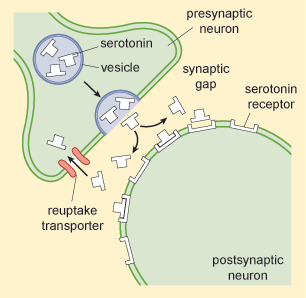Biological Approach to explaining OCD
Genetic explanations
OCD is a mental disorder that has a large biological component to it.
A study by Lewis (1936) found that of his patients, 37% had parents with OCD and 21% had siblings with OCD. This shows a genetic link and indicates that OCD runs in families. OCD sufferers pass on the genetic vulnerability to children (not the certainty of OCD) and the condition is often triggered by a stressful or traumatic experience.
Researchers have identified the genes that create the genetic vulnerability for OCD - candidate genes.
The first is the SERT gene which affects the transmission of serotonin back to the pre-synatpic neutron (re-uptake). People with this gene have lower levels of serotonin.
The second is the COMT gene which regulate the production of the neurotransmitter dopamine. Dopamine is evolved with the brains reward system. High levels of dopamine are are associated with compulsions: the simple repetitive behaviour are rewarding for the OCD suffers because they relieve the anxiety.
High dopamine levels and low serotonin levels are associated with OCD.
Evaluation point
There is strong evidence to support the genetic explanation for OCD. A study by Carey and Gottesman found that there was a 87% concordance rate for OCD between MZ twins compared to 47% between DZ twins. Counterpoint - for OCD to be entirely genetic, the concordance rate would need to be 100% between MZ twins as they have identical genes, but its only 87%. This suggests there are other factors at play in triggering OCD, according to the diathesis-stress model, certain genes leave some people more likely to develop a mental disorder.
OCD is Polygenic
OCD is not caused by one single gene, but by a combination of genetic variations that increase a person's vulnerability to developing OCD. Taylor (2013) found that there could be up to 230 genes involved in OCD.
Neural explanations
Serotonin and neurotranmission
One explanation for OCD is related to the neurotransmitter serotonin, high is also known as the happy hormone.
Neurotransmitters relay information from one neuron to another and if a person has low levels of serotonin then the normal level of serotonin does not take place. This lack of transmission can lead to low mood.
Abnormal brain function
Another explanation for OCD can be abnormal brain function. The lateral (side bits) of the frontal lobe may be functioning incorrectly and this in turn leads to impaired decision making. The frontal lobes are the part of the brain that responsible for logical thinking and decision making.
Evaluation
One support of the neural explanation is th effectiveness of antidepressants that work purely on serotonin and are effective in reduced OCD.






Comments
Post a Comment